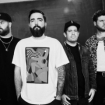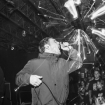Revolver has teamed with Militarie Gun for an exclusive vinyl variant of Life Under the Gun — limited to 500 copies. Get yours from our shop!
Ian Shelton is terrible at moderation. "I let everything just consume me entirely," admits the Militarie Gun frontman.
It's this insatiable hunger that made him dive headfirst into hardcore punk as a teenager, and never really care about anything else again. It's this that meant when the pandemic started and shows with his other project, the excellent grindcore band Regional Justice Center, were cancelled, he locked himself in his practice room and didn't emerge until he'd written Militarie Gun's first EP. It's this that led him to spend nearly every waking moment of the last three years pushing himself to write better, bigger songs, the kind that define a band forever.
Now, Militarie Gun (completed by guitarists William Acuña and Waylon Trim, bassist Nick Cogan and drummer Vince Nguyen) are rolling out their debut album, Life Under the Gun, and they're reaping the rewards of that rabid hard work. For one thing, they've signed to Loma Vista Recordings (home to Ghost, Korn and Killer Mike) and Jay-Z's Roc Nation Management, making them officially a big-time band. They've toured arenas opening for Limp Bizkit, on a lineup curated personally by Fred Durst. And most importantly, these songs rock hard.
The band has landed on a sound that fuses hardcore with the best of Nineties alt rock and Sixties classic rock; anything with a big chorus and a snotty snarl, that's Militarie Gun's lane. "I've never worked on something harder in my life," says Shelton.
The process of writing was, since Shelton doesn't have any other mode, intense. The entire album went through three rounds of demos. He'd wake up at 5 a.m., record an idea, listen to it all day at work delivering (legal) weed, and work on it more at night. The album is cleaner, bigger, more melodic and straight-to-the-point than the slightly grittier stuff on the band's previous EPs. But that's not exactly deliberate — or rather, it finally is deliberate.
"This is the stuff that I thought I was making before — I just didn't have skilled enough hands to actually do what I was going for. And so with the constant nature of just trying, eventually you arrive somewhere, and this is where I arrived."
Recording with producer Taylor Young (Nails, Drain, God's Hate), the band got to set up shop in the Foo Fighters' Studio 606 for two days thanks to a contact of Young's. (The Foos themselves were just down the hall working on the Studio 666 movie at the time, though they didn't meet because of COVID restrictions.) "I got to play Dave's acoustic 12-string on a bunch of songs," says Shelton, "and going in and seeing the Nirvana and Foo Fighters plaques was really crazy."
Most exciting, they were recording on the Neve 8028 console that Grohl had rescued from the legendary Sound City Studios. "All these classic albums — Fleetwood Mac, Nevermind, all those sounds passed through that board. It was very surreal."
In keeping with that sense of reverence, the album was deliberately crafted for timelessness. They only used classic instrumentation: on top of the requisite guitar, bass and drums, there was Rhodes piano, mellotron and organ. Shelton wanted it to sound like the Rolling Stones and the Who as much as he did Black Flag.
Even if Life Under the Gun doesn't inherently sound like a hardcore record, Shelton's incendiary, antagonistic lyrical approach is a firm link back to punk rock. He barks at time-wasters on "Do It Faster," swats at "biting bastard leeches" on "Seizure of Assets." "It's meant to be the poppiest song but also be like, wait, what the hell's this guy saying? It's supposed to elicit a reaction," Shelton explains. "That's the classic debate: Is punk a sound or is punk an attitude? And I definitely would like to fuck with people who would call us not a punk band, 'cause to me, there's no way that any band I'm in isn't a punk band."
That's not to say this album is just about aggression. Shelton was drawing on his life experiences of growing up around addiction — his parents struggled with substance abuse throughout his childhood — and reckoning with the impact that's had on how he's treated others. There's some heavy introspection on tracks like "Big Disappointment" and "Sway Too," and on "Never Fucked Up Once," he laments the idea of cancel culture in the punk scene.
"What I try to do is say something meaningful through some absurd amount of melodrama. I really wanted it to half sound like an action movie, half sound like an unfiltered diary," he says. "I grew up going to AA meetings with my mom, and the [idea] that people are thrown in the trash was never even a concept to me. Life is about working and getting better and making amends."
The band's boundless, anthemic approach to punk has already won them plenty of fans, making them one of hardcore's biggest breakout bands of the last few years. But Life Under the Gun hints at an even bigger breakout, a promise-slash-threat that Militarie Gun could take the rock world by storm at any moment. It's the best kind of rock record — the kind that's just undeniable, that hits like a cannonball.
"I think it's gonna be the thing that defines the band," says Shelton. "We'll live in the shadow of this, probably. That's my goal — we wrote a record so good we have to live in the freaking shadow of it!"












